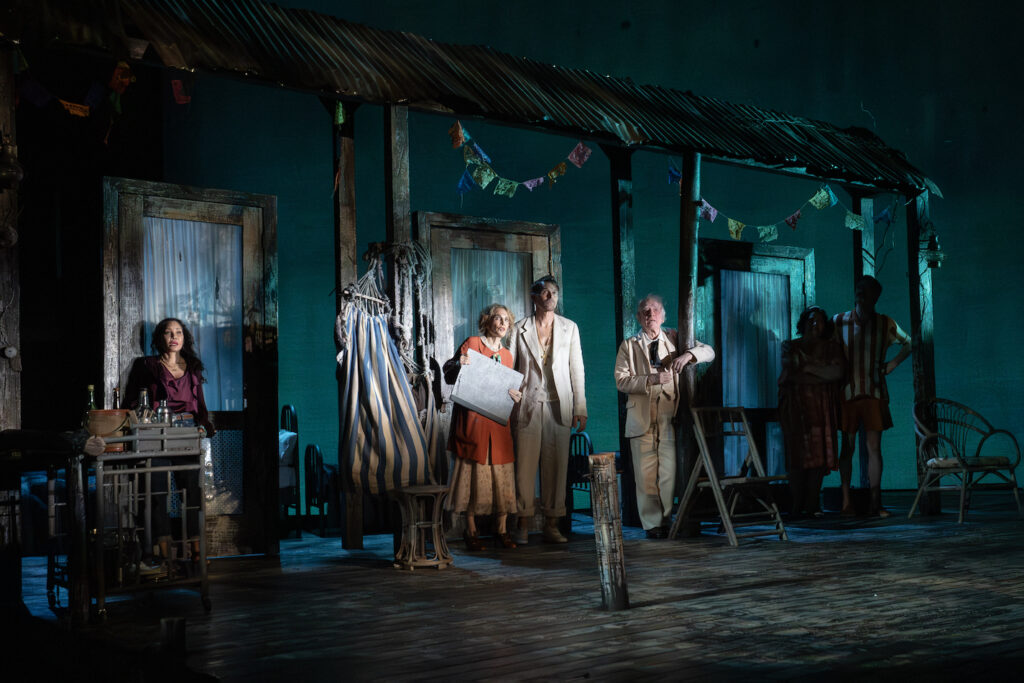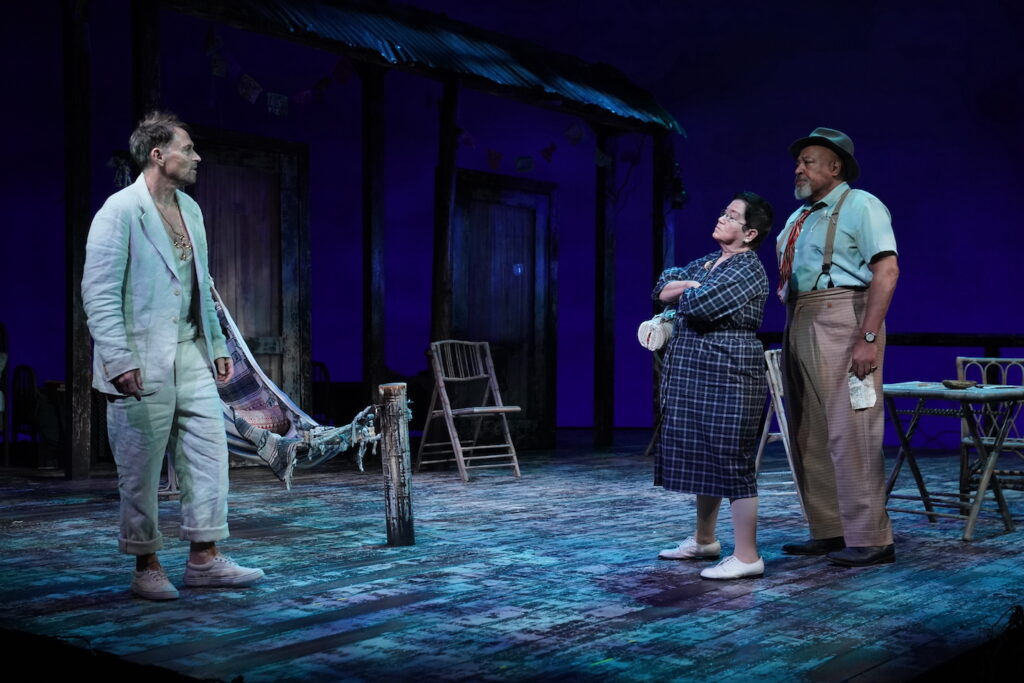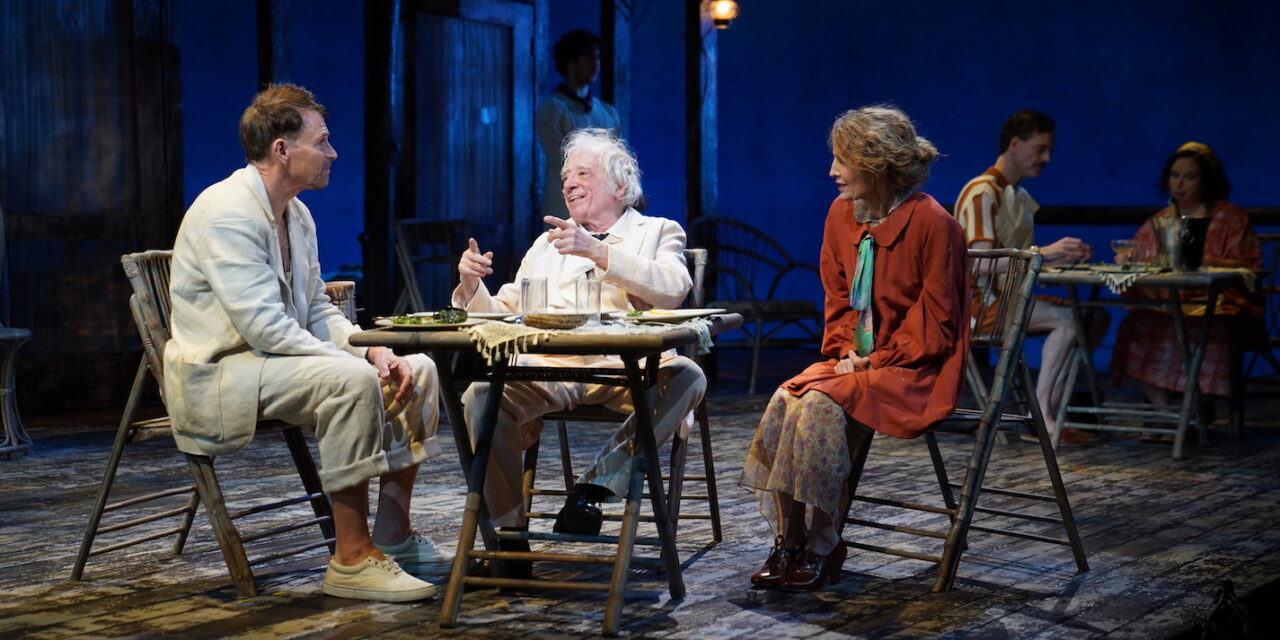Theater Review by Samuel L. Leiter . . . .
Tennessee Williams’s greatest plays were produced over the better part of two decades, between 1944 and 1961, when The Night of the Iguana premiered on Broadway, starring Patrick O’Neal as the Rev. T. Lawrence Shannon, Bette Davis as Maxine Faulk, and Margaret Leighton as Hannah Jelkes. It was his last highly acclaimed drama, following such often revived works as The Glass Menagerie, A Streetcar Named Desire, Cat on a Hot Tin Roof, Summer and Smoke, and Sweet Bird of Youth.
However, it received only three New York revivals, in 1976, 1988, and 1996, all on Broadway. In those productions the first two were at the Circle in the Square where audiences saw Shannon, Maxine, and Hannah played by, first, Richard Chamberlain, Sylvia Miles, and Dorothy McGuire; second, Nicholas Surovy, Jane Alexander, and Maria Tucci; and third, William Petersen, Marsha Mason, and Cherry Jones.

The play’s first Off-Broadway staging is now at the Pershing Square Signature Center’s Irene Diamond Theatre, with Shannon, Maxine, and Hannah played by Tim Daly (Coastal Disturbances), Daphne Rubin-Vega (Anna in the Tropics), and Jean Lichty (Nora). (Lichty’s La Femme Theatre Productions is the producer.) Sadly, it’s a middling effort that does little to enhance the reputations of anyone involved, including esteemed director Emily Mann (Execution of Justice).
So uninspired is the acting, so aimless the staging, and so loquacious, plotless, and dramatically inert does much of the writing seem in this revival that one wonders why The Night of the Iguana is classed among the best of Williams’s oeuvre rather than with the weaker works associated with his later years.
But then one views John Huston’s vividly acted 1964 film version, starring Richard Burton, Ava Gardner, and Deborah Kerr, and the question is answered: The Night of the Iguana requires first-rate performances and direction if it’s going to succeed. Even then, given what we know of its evolution from short story to a nearly three-hour play that followed multiple rewrites, it could profit from the blue pencil.


Williams concentrates here more on mood and atmosphere than extremes of dramatic action as he lyrically contemplates the internal dilemmas of a group of lonely people in the steamy summer heat of 1940 at the Hotel Costa Verde. This rundown resort, overlooking a rainforest on Mexico’s west coast, is the property of Maxine, whose husband, Fred, died only recently. As the generally flat, atmospherically vapid production rambles along, we slowly discover why Shannon, Maxine, Hannah, and Hannah’s grandfather, Nonno (the ubiquitous Austin Pendleton) are each somehow at the end of their rope.
Among the multiple themes, critics have noted in The Night of the Iguana—many repeated in his other plays as well—is the conflict between the flesh and the spirit, the body and the soul. Maxine is a blowzy, colorful, middle-aged creature of the flesh, the not-so-obscure object of her desire being Rev. Shannon, in whom the carnal/spiritual struggle is clearly embodied. This seedy, self-pitying alcoholic, and serial fornicator, is a defrocked Episcopal priest removed from his parish for his heretical denunciation of God and for having seduced an underage girl; he makes his living in Mexico as a tour guide for American clients, his basic needs seen to by Maxine. His present tour group is a busload of Texas schoolteachers led by an assertive lesbian named Miss Judith Fellowes (Lea DeLaria, On the Town), angrily dissatisfied with his arrangements.
Hannah, a beautiful, spiritually inclined spinster of 40, is an itinerant artist accompanying her wheelchair-bound, 97-year-old grandfather, a “minor league poet with a major league spirit” named Jonathan Coffin, whom she calls Nonno. He’s been struggling for 20 years to finish his last poem before he dies. Indigent, they make their way by Hannah selling her watercolors and by Nonno reciting his poems. If Maxine represents carnality, Hannah is the opposite. Hannah is too pure for Shannon, who finds the hedonistic Maxine more suited to his needs.


Among the minor characters is a seductively good-looking adolescent tourist named Charlotte (Carmen Barkeley) who stirs Shannon’s inappropriate urges, to Miss Fellowes’s disgust. The others include a pair of annoyingly clownish Nazi tourists (Michael Lee Cook and Alena Acker), joyfully obsessed with listening to the news of London’s being blitzed. (They were cut, thankfully, from the movie.)
Most of Act One is devoted to exposition about who, what, and where. The second act (almost like a separate play) is heavily devoted to a colloquy between Shannon and Hannah during which she describes to the inquisitive Shannon the only two sexual experiences, both peripheral, of her life. It’s potentially the play’s most compelling moment but Lichty’s mundane rendering lacks any spark of incandescence. As the feverish Shannon struggles to find redemption, Hannah, needy as she is, reaches out to help, but the moment passes, and each finds the courage to accept their condition, he returning to Maxine, she moving on alone.
Shannon and Hannah somehow manage to free themselves from their bonds, as does Nonno when he finally completes his poem, allowing him to die in peace. Symbolizing their release is a scene concerning the titular iguana, tied up offstage with neither food nor water by the hotel’s boy employees (Bradley James Tejeda and Dan Teixeira), who plan to eat him. Shannon, urged by Hannah, goes off with a knife to cut the creature loose from bondage.


Neither Daly (a bit shaky with his words at the preview I attended) nor Lichty succeeds at lifting their duologue from bland verbosity to the lyrical heights demanded; consequently, many may shift their eyes from the stage to their wrists, wondering why the show started at 7:30 instead of 7:00. Daly, his face unshaved and wearing a ratty, white linen suit, is—even at 67—still handsome enough to suggest someone to whom women are drawn, but his charisma could use recharging; the long scenes in which he’s stuffed into a hammock—perhaps meant to evoke his similarity to the roped-up iguana—do little to enhance his presence.
For all the peppiness Rubin-Vega brings to Maxine, and her effort to convey her sexuality via a decolletage-exposing blouse, her girlish persona misses the woman’s musky carnality and broad flamboyance. Lichty, her voice colorlessly bland, is incapable of capturing Hannah’s ethereal quality. Pendleton, whose familiar mannerisms always make him noteworthy, if not exceptional, offers little we haven’t seen before. When Nonno’s big moment arrives, the reading of his poem, he rushes through it.
The best known among the supporting players, who range from adequate to competent, is comedian Lea DeLaria, but she pushes too hard as the disgruntled Miss Fellowes in her effort to make an impression. Emily Mann’s direction might have helped, but, overall, her work here lacks style, energy, and definition.


Despite a design team composed of leading New York artists, the results are mixed. Beowulf Boritt’s set makes the sketchily depicted hotel, at our left, look far too shabbily dilapidated for human habitation. Its row of wall-less doors look more like beach cabanas than entrances to guest rooms. (The set for the 1961 production was praised for its striking naturalism.) At one point, a series of door openings and closings nearly gives the impression of a nascent Feydeau farce. Jeff Croiter’s lighting does what it can to create a tropical feeling, splashing a changing pastel palette on the sky backdrop. Jennifer von Mayrhauser’s costumes just barely capture the essence of 1940, although Maxine’s jeans appear to be out of period.
Surely, given the reputation of its author, there’ll one day be a fifth New York revival of The Night of the Iguana. Only time, however, will tell if it’s able to redeem the play’s reputation after the misfire of its present production.
The Night of the Iguana. Through February 25 at the Pershing Square Signature Center/Irene Diamond Theatre (480 West 42nd Street, between Ninth and Tenth Avenues). www.iguanaplaynyc.com
Photos: Joan Marcus


















